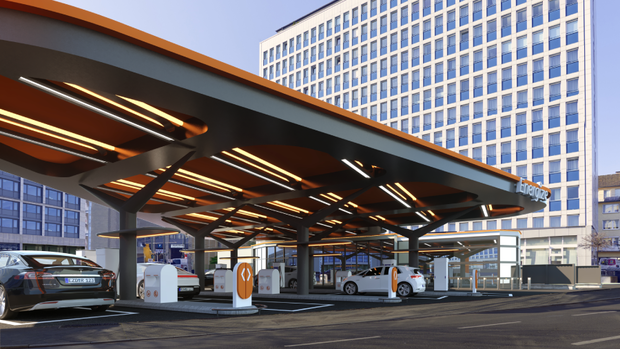The first quick-charging filling station planned by the start-up Energize opens in Düsseldorf.
(Photo: Energize)
More and more electric cars are on the roads. On January 1, 2023, more than one million electric vehicles were registered for the first time, an increase of 64 percent within one year, according to the Federal Motor Transport Authority (KBA). It would probably be even more if charging the vehicles weren’t so complicated, especially in the big cities. Because there are often not enough charging options in the immediate vicinity of the apartment. That should deter many potential buyers.
Two newly founded companies want to contribute to increasing the range of charging stations. This includes the start-up Energize, which is planning fast-charging filling stations for e-vehicles in the seven top cities of Hamburg, Berlin, Cologne, Düsseldorf, Frankfurt, Stuttgart and Munich according to the plans of founder and CEO David Peter.
The success of combustion cars is partly due to the fact that there is a nationwide range of filling stations and thus the possibility of staying mobile permanently, says Peter. Exactly this offer is needed for e-cars. “We don’t have to reinvent the wheel.”
Peter, who is also CEO of the real estate company Connex, is planning a first serve near Düsseldorf’s main train station. Connex already has a suitable property there with a former gas station in its portfolio, which is to be converted into a charging station for electric cars.
Twelve charging stations at six columns are planned. There is also a shop-in-shop concept with a supermarket chain where customers can bridge the waiting time. However, this is limited to 15 to 20 minutes. Peter is convinced that this makes it possible to integrate the charging process into everyday life.
The fast charging stations charge the cars with a maximum output of 300 kilowatts (kW). How full the batteries are in the given time depends on the model. With electric cars that are one or two years old, the power is usually sufficient for around 250 to 300 kilometers after 15 to 20 minutes, says Peter. The electricity comes exclusively from renewable energies.
If the first gas station is well received, the Energize founder wants to expand the network. Depending on their size, the stations then have between two and eight charging stations and a shop for the larger variants. Payment is always cashless and independent of the respective electricity provider. “That means our customers don’t have to have a specific charging card or be a member of a provider,” says Peter.
In his view, inner-city plots of land, for example former gas stations and workshops, or large parking lots for supermarkets are ideal for the concept. He can also imagine a franchise system. He also wants to offer his start-up as a partner for project developers developing inner-city districts.
More about electromobility
Whether enough e-cars will roll up to the charging stations for the concept to be viable will have to be seen when the first filling station opens this fall. The founding of eternigy also shows that the range of charging stations is growing with the increasing number of e-cars and also the legal requirements for property owners. The subsidiary of HIH Real Estate plans, implements and operates charging stations for electric vehicles in residential and commercial properties.
The investment manager founded the company because he could not find a suitable e-mobility service provider, said Falk Schönberg, managing director of eternigy and senior asset manager at HIH Real Estate in early April. “There was often a lack of knowledge about the specific challenges of real estate.”
Eternigy offers its charging solutions for the properties managed by the HIH Group as well as for those of external portfolio holders, fund and asset managers. Here, too, only electricity from renewable energies fills the vehicle batteries. The charging stations are set up in underground car parks and on outdoor parking spaces in residential and commercial properties.
“At the start, eternigy’s order book already includes over 20 projects with more than 400 charging points in Germany and one in Vienna with 40 charging points,” said Schönberg. The goal is 1000 charging points in the next three years.
This text first appeared on April 28, 2023 in the Handelsblatt newsletter Inside Energie & Immobilien.
More: Jolt Energy wants to bring charging stations to cities
